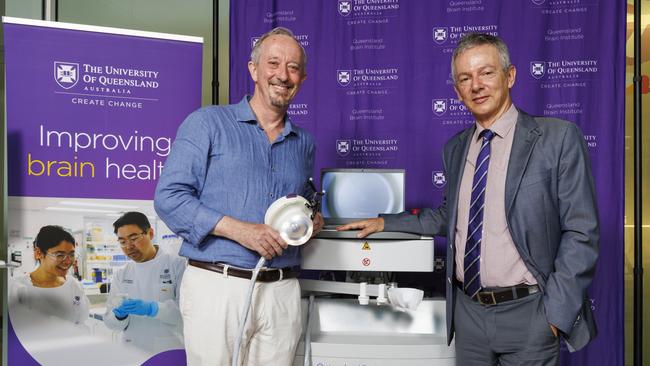Ultrasound Alzheimer’s treatment starts human trials
Animal studies show blasts of ultrasound can restore cognitive function and boost the effect of drugs, University of Queensland researchers say.

Australian-developed technology using ultrasound to clear toxic plaque in the brain linked to Alzheimer’s disease has entered human trials, in a promising step forward.
Animal studies have shown that blasts of ultrasound can restore cognitive function and boost the effect of drugs, University of Queensland researchers say.
A team at UQ’s Queensland Brain Institute led by professor of dementia research Jurgen Gotz has taken a decade to ready a prototype device to test on human subjects.
“The results we are seeing with this treatment in animal testing makes us hopeful that it could also work for people,” he said on Tuesday, announcing the clinical trial. “There is currently no effective treatment for Alzheimer’s, so it is hugely rewarding that we can potentially treat the disease with ultrasound and improve or restore cognitive function.”
Up to 12 people will participate in the phase-1 program to demonstrate that the technology is safe to progress to tests of its effectiveness.
In a preview in The Weekend Australian Magazine a year ago, Professor Gotz described how ultrasound acted on both amyloid plaque and spaghetti-like tangles of the protein, tau, that clog the brain of an Alzheimer’s patient.
Just as a dental descaling device shakes oral plaque off a tooth, the theory is that low-intensity ultrasound exerts a mechanical force to do that and more deep inside the skull: applied correctly it could “melt” the damaging brain deposits, Professor Gotz said.
When paired with intravenously administered microbubbles, the near-impenetrable blood-brain barrier was levered open to supercharge drugs such as aducanumab, which acts on amyloid plaque.
How confident was he that his ultrasound device could help Alzheimer’s patients? “Obviously there are a few more hurdles to tackle,” he told The Australian. “It’s a safety trial, and you don’t make unjustified conclusions from a safety trial. But it’s an important stepping stone.”
UQ researcher and neurologist Peter Nestor, who is overseeing the year-long trial, said each participant would receive four ultrasound treatments, a fortnight apart. “We’re treating an area at the back of the brain that is affected early in the course of Alzheimer’s disease,” he said.
QBI director Pankaj Sah said the safety study was a milestone, building on a decade’s work on Alzheimer’s disease.
“The use of ultrasound to treat the most prevalent form of dementia is enormously exciting because it tackles one of the biggest health challenges of our time,” he said.
By mid-century the number of Australians living with dementia is forecast to top one million.




To join the conversation, please log in. Don't have an account? Register
Join the conversation, you are commenting as Logout